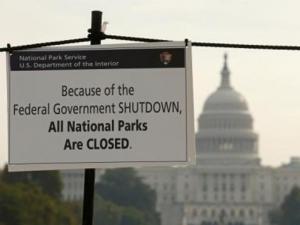Amid shutdown, US cancels trade talks with the EU

The Hill | 4 Oct 2013
Amid shutdown, US cancels trade talks with the EU
By Vicki Needham
Trade talks between the United States and the European Union set for next week have been nixed because of the government shutdown.
U.S. trade officials were forced to delay the second round of talks scheduled to start next week in Brussels because of the congressional impasse over a spending plan.
Congressional Republicans are insisting that Democrats defund and delay President Obama’s signature healthcare law in exchange for reopening the federal government.
The U.S. Trade Representative’s office has been stretched thin with staff furloughs because of the government’s closure; that was further exacerbated by trade talks on two major fronts,l in Europe and at the Asia-Pacific Economic Cooperation (APEC) in Bali, Indonesia.
Ambassador João Vale de Almeida, head delegate of the EU to the United States, said on Twitter that: "Unfortunately US govt shutdown forces cancellation of 2nd #TTIP round. The EU is ready when you are!"
EU Trade Commissioner Karel De Gucht said that U.S. Trade Representative Michael called him on Friday citing the furloughs as the reason why the United States would be unable to send an officials to Brussels for negotiations on the Transatlantic Trade and Investment Partnership (TTIP).
"The U.S. side has promised to provide us with further information as soon as is feasible on when and how further occasions for engagement —including negotiation rounds — can be scheduled," he said in a statement.
"The cancellation of next week’s negotiation round in Brussels is clearly unfortunate but let me underline that it in no way distracts us from our overall aim of achieving an ambitious trade and investment deal between Europe and the U.S., which will bring real economic benefit to people on both sides of the Atlantic."
U.S. and EU leaders have heralded a future agreement as a roadmap to improved global trade.
"It is unfortunate that the government shutdown is preventing USTR from proceeding with the second round of TTIP negotiations," said John Murphy, the U.S. Chamber of Commerce’s vice president of international affairs.
"The Chamber continues to urge Congress and the administration to work together immediately to find a path forward on the CR and debt limit to remove any threat to the full faith and credit of the U.S. government," he said.
"This requires compromise by both sides."
Marjorie Chorlins, the Chamber’s senior director for Europe, who is on the ground in Brussels discussing the deal with negotiators said the business-focused delegation "came away from those meetings convinced that, while negotiations will be tough, the U.S. and EU can achieve a comprehensive and ambitious transatlantic trade and investment accord."
She called the delay a "disappointing development" but argued that it "should not diminish the commitment and momentum needed to secure a world-class agreement."
This is the second blow to U.S. trade talks within the past day.
Late Thursday, the White House announced that President Obama had canceled his upcoming trip to Asia, blaming congressional Republicans and the government shutdown for his decision to remain in Washington.
Secretary of State John Kerry will attend the APEC summit in Indonesia and the East Asia Summit in Brunei in place of the president.
There was some hope that the 12 nations involved in the Trans-Pacific Partnership (TPP) would be able to announce a basic agreement during the Bali summit with Obama on hand.
But it became clear on Friday that any announcement would be delayed, according to news reports.
Froman said that wrapping up a deal at the meeting wasn’t going to be possible.
Obama has pressed for a greater U.S. economic presence in Asia and has said he wants to see the TPP completed by the end of the year.
Some trade advocates, including Public Citizen, have argued that there is too much work to be done and major chapters of the TPP deal are incomplete, including issues such as agriculture and intellectual property protection, to envision an end to the talks anytime soon.





